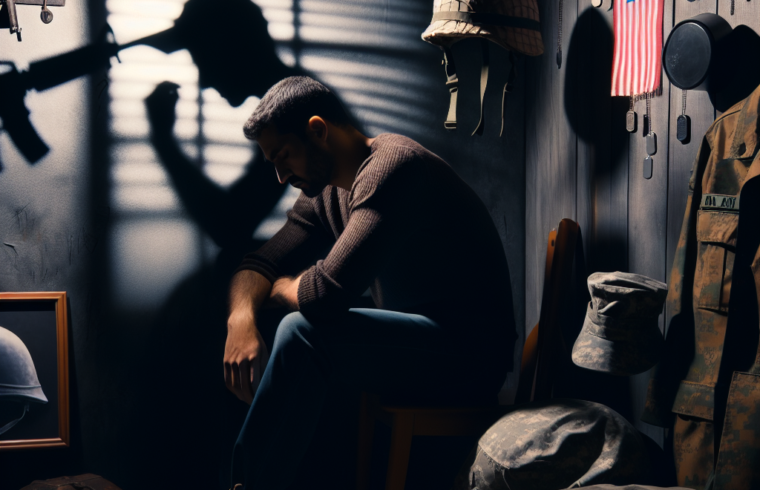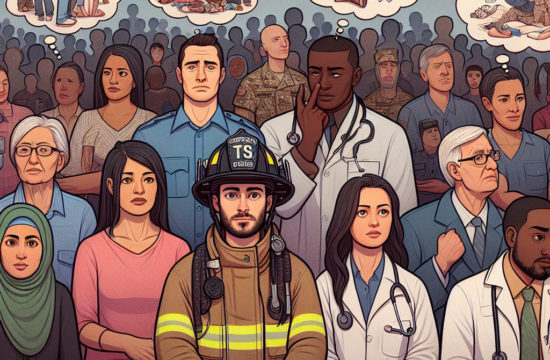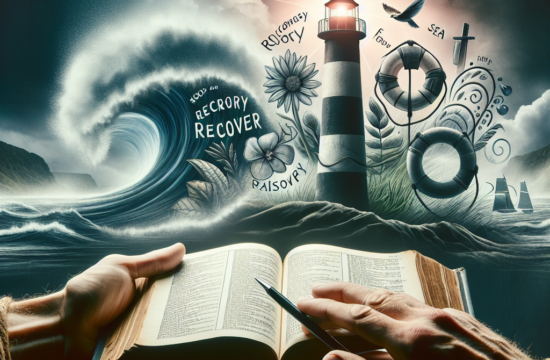==> Thank you for reading this post! Click Here If you are looking for support and Victory over PTSD.
Faith-Based PTSD Recovery: A Path to Healing
- Managing PTSD through Faith
- The Role of Community in Healing
- Spiritual Practices that Foster Recovery
- Finding Professional Help within Faith-Based Contexts
Managing PTSD through Faith
Understanding Faith’s Impact on PTSD
In my experience, faith can have a significant impact when it comes to managing PTSD. At its core, faith offers a sense of purpose and belonging, which is crucial after facing traumatic events. There’s something comforting about knowing that a higher power is with you, especially during tough times.
The belief in something greater than ourselves can help provide hope and direction when everything seems lost. Many folks I know have shared how their faith has allowed them to process their trauma in a way that feels safe and supported. It’s like holding onto a life raft in a stormy sea.
Additionally, integrating faith into PTSD recovery can create a more profound narrative around your experiences. Instead of just being defined by trauma, one can begin to see themself as part of a larger spiritual journey, which can be incredibly empowering.
Turning to Scripture for Comfort
For me, diving into scripture has been a grounding experience. Verses that speak about peace, love, and healing can serve as reminders that we’re never alone in our struggles. When I’m deep in my feelings, flipping through the Bible and finding a verse that resonates can shift my entire mindset.
It’s all about finding those words that speak to you personally. Whether it’s a phrase that encourages you to keep moving or one that simply reminds you of God’s love, these scriptures can provide the comfort that often feels out of reach.
Moreover, it can be really therapeutic to journal your reflections on certain passages, as it helps solidify those comforting sentiments and creates a personal connection with your faith.
Faith and Forgiveness
One of the most challenging aspects of dealing with PTSD can be the anger and resentment we hold towards others—or even ourselves. I’ve found that addressing forgiveness through my faith has been a transformative element of my healing journey. It’s tough, no doubt, but it opens up a pathway to release some of that pent-up negativity.
Through prayer and reflection, I’ve learned to see forgiveness not just as a one-time act but as a process. Each day, I’m reminded that it’s okay to still feel hurt while also choosing to let go of the burden of anger.
By embracing forgiveness, I not only release my attachment to the pain but also reclaim my power, which is such a liberating feeling.
The Role of Community in Healing
Finding Your Support System
Can I just say how important it is to have a community when you’re navigating PTSD? I’ve always been a bit of a lone wolf, but I discovered that having people around who get it makes all the difference in the world. Whether it’s family, friends, or a church group, finding a supportive circle has been key to my journey.
It’s about having those folks to lean on, who not only listen but also uplift you. Often, just being in an environment full of empathy and understanding starts to chip away at those dark moments. Being with others who share similar experiences can be incredibly validating too.
Open conversations about faith and healing can lead to deeper bonds that foster a sense of belonging and boost your hope for recovery. Don’t underestimate the power of a shared laughter, tears, and life experiences!
Participating in Group Activities
Group activities, whether they’re casual meet-ups or organized faith retreats, can be extremely healing. I recall attending a healing retreat organized by my church, and it was like a breath of fresh air. Surrounded by others who were openly sharing their stories, I felt an instant sense of understanding and connectedness.
The energy of being with others who are actively seeking healing is palpable. It’s contagious! That earnest drive for personal growth reminds us that we’re all in this together, making the journey a little less daunting.
Additionally, participating in collective prayer or worship can magnify the sense of community as we connect to something larger than ourselves together. It can be powerful and allows for a shared experience of faith and vulnerability.
Service and Giving Back
One of the most surprising and rewarding aspects of my healing journey has been realizing how helping others can actually help myself. Engaging in community service projects allows individuals to step outside of their struggles and contribute to a greater cause.
It’s a win-win! Not only do you help those in need, but you also find a renewed sense of purpose and fulfillment. Whether it’s volunteering at a local shelter or participating in church activities, these experiences remind us that healing is a shared journey.
Through service, I’ve made new friends, developed new skills, and most importantly, gained perspective on my own journey. It’s a beautiful way to see that we’re never truly alone, and that’s comforting in every possible way.
Spiritual Practices that Foster Recovery
Prayer as a Healing Tool
Prayer has been my go-to when facing PTSD. It’s like having a direct line to God—a safe space to unload all my thoughts and feelings without judgment. When I begin to feel overwhelmed, I’ll take a moment to pray and just breathe. There’s something so grounding about it.
Through prayer, I’ve managed to hone in on what I genuinely need, whether it’s peace, clarity, or strength. Plus, it’s a great way to express gratitude for the small victories in the healing process, which can sometimes get overshadowed by the bigger challenges.
Get Started with Recovery! Visit us for more Information and Support
Understanding that I can submit my burdens to God has lightened my heart immeasurably. It’s about that interpersonal connection and the release that comes with trusting a higher plan.
Meditation for Mindfulness
I’m all about taking a breather, and meditation has been a game-changer in managing my PTSD. These quiet moments allow me to center my thoughts and refocus on what matters. Even just a few minutes a day can drastically shift my perspective.
It’s fascinating how mindfulness can help detach from overwhelming emotions or anxiety. In those still moments, I’ve learned to observe my thoughts rather than getting swept away by them. It’s like stepping back and realizing that while my feelings are valid, they don’t have to define my day.
Plus, incorporating spiritual themes into meditation—like visualizing light or love—has amplified my sense of peace. It’s all about finding your rhythm and letting those practices unfold in a way that resonates with you.
Creative Expression through Faith
One of my favorite ways to connect with my healing journey is through creative expression. Whether it’s writing, drawing, or composing music, tapping into your artistic side can be a deeply spiritual exercise. For me, journaling provides a safe outlet for processing my experiences.
When I write, it feels like I’m engaging in a dialogue with God—expressing my pain while also seeking insight and understanding. It’s pretty humbling how raw vulnerability can lead to artistic creation. Sometimes, I’m amazed when I look back and see the messages of hope coming through my own words.
Additionally, participating in creative workshops that focus on faith can foster community while encouraging personal growth. Trust me, diving into your creativity can be a liberating and fulfilling aspect of recovery.
Finding Professional Help within Faith-Based Contexts
Therapists Who Understand Faith
When I first considered therapy, I knew I wanted someone who understood my faith background. It made all the difference to find a therapist who integrates spirituality into their practice. Having someone who gets my beliefs really allows for a more holistic healing approach.
It’s not just about tackling the symptoms of PTSD; it’s about addressing the whole person. Faith-informed therapy often acknowledges the unique struggles that arise from intertwining trauma and belief, allowing for deeper healing.
So don’t hesitate to seek a counselor who honors both your mental health and spiritual wellness. It’s a partnership that can lead to extraordinary breakthroughs.
Christian Support Groups
Support groups grounded in faith can provide a fantastic space for healing. When I found a local Christian support group focused on mental health issues, it was like a breath of fresh air. Sharing with others who were on a similar journey was incredibly validating.
There’s strength in vulnerability; knowing I wasn’t alone in my struggles truly helped me take steps forward. Plus, hearing others’ stories of hope can be so inspiring! You leave feeling uplifted and supported, reminding you that healing is indeed a journey.
If you’re searching for a supportive community, definitely look into faith-based groups. You never know how much they can enrich your healing process.
Bridging Faith with Therapy Techniques
Integrating therapeutic techniques with faith can lead to a richer, more effective healing experience. I’ve found that some therapists are well-versed in combining evidence-based practices with spiritual insight, which allows for a more comprehensive approach.
For example, using cognitive-behavioral techniques alongside prayer or scriptural reflection can open up channels for healing that are both practical and spiritual. Plus, there’s something comforting about knowing you’re addressing your mental health with an understanding of your spiritual beliefs.
So don’t shy away from asking your therapist about how they can incorporate your faith into the recovery process! It’s a powerful combination that can help you navigate your journey even more effectively.
FAQs
What is faith-based PTSD recovery?
Faith-based PTSD recovery combines traditional therapeutic techniques with spiritual practices and beliefs. It emphasizes the importance of community, prayer, and spiritual growth in addressing trauma and promoting healing.
How can community support aid in PTSD recovery?
A supportive community can provide empathy, understanding, and a sense of belonging, which is crucial for healing. Engaging with others who share similar experiences can validate feelings and offer hope and encouragement.
What spiritual practices are effective for PTSD recovery?
Practices like prayer, meditation, and creative expression can help individuals manage their emotions and foster healing. These activities allow for introspection and connection with one’s faith, facilitating emotional processing.
How do I find help within a faith-based context?
Look for therapists who specialize in integrating spirituality into their practice, or seek out Christian support groups that focus on mental health. Engaging in community service or attending faith-centered workshops can also provide additional support.












